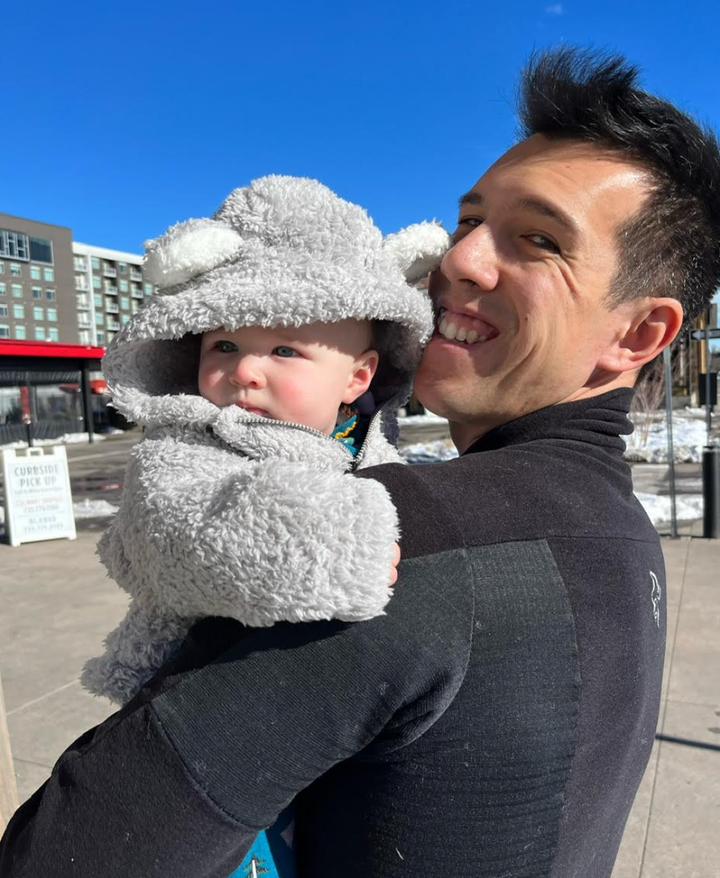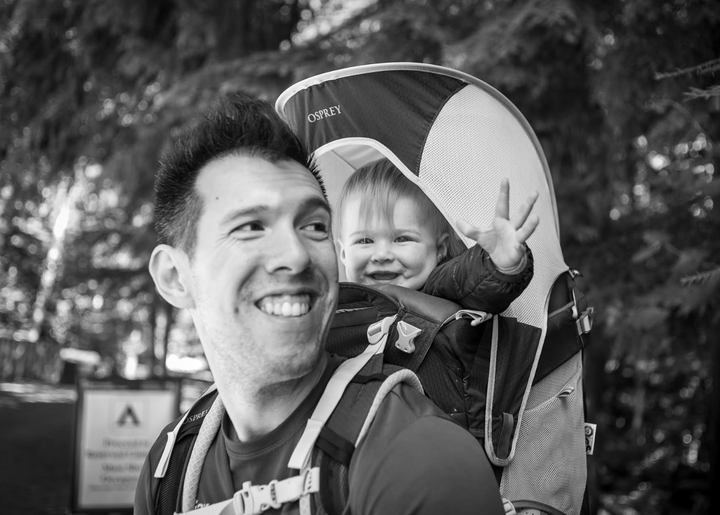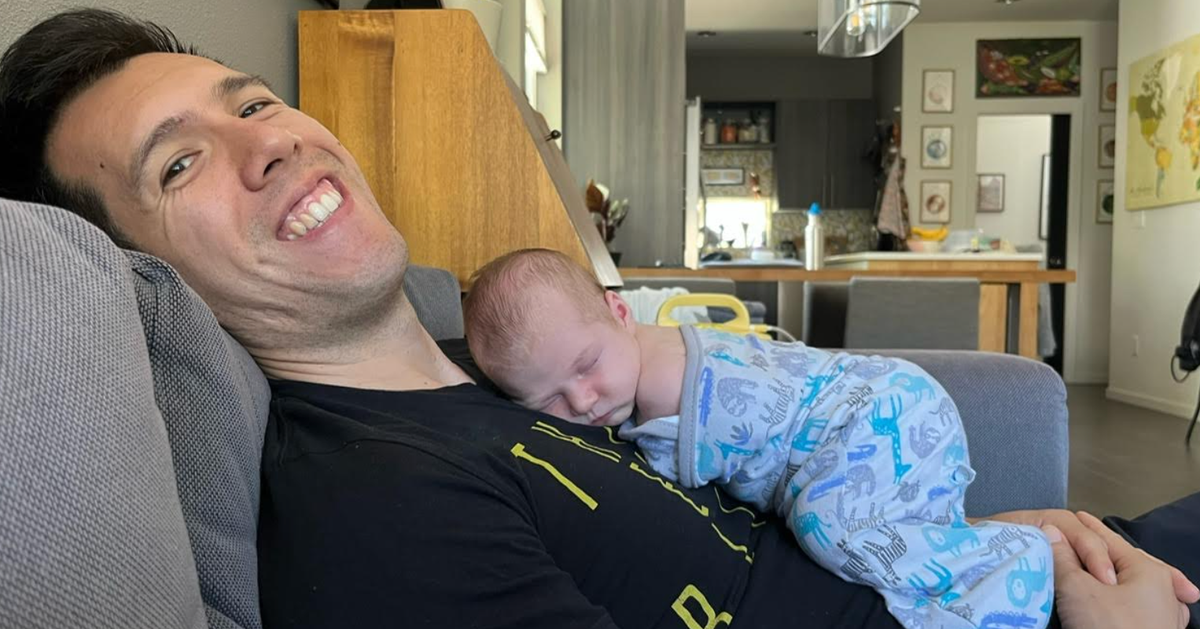Moments after my daughter’s birth, I was in tears, though not the kind I was expecting. My wife, Meghan, had just endured a grueling 18-hour labor, and I was standing at the foot of her bed as the doctor retrieved a ruddy, shrieking alien from between her legs and placed it in her arms.
“She’s certainly vigorous,” the doctor said, her voice overly upbeat. “At least you won’t have to worry about her not communicating her needs.”
For the first several hours of her life, Juniper didn’t stop making her needs known. A nurse led us to a fluorescent-lit room barely wide enough for two beds and closed the door, trapping the cries — and us — inside.
From the outset, breastfeeding went poorly. We were harvesting colostrum like a rare earth mineral and feeding it to Juniper through a syringe. We tried swaddling her, but she easily wriggled free. Eventually, Meghan pressed Juniper against her body, hoping that one of skin-to-skin’s seemingly mystical qualities included temporary paralysis (it didn’t).
Outside, the sky was a perfect June blue in Seattle, the Olympic Mountains jutting out clear and white against the horizon. I thought about how, just a few days prior, Meghan and I had watched a breakdance performance at the Neptune Theatre, gone out for Indian food, bought Kewpie mayo at Costco. The modest makings of a life I’d now give anything to reclaim.
I stared at this being — my daughter — in disbelief. I wasn’t overcome by the miracle of life. I wasn’t swept up in love and oxytocin. Instead, I felt a wave of regret so great it threatened to upset my stomach. I crawled into bed next to Meghan, this life we had created resolutely between us.
“I miss us,” I managed to eke out between sobs.
I knew it was a terrible thing to say. Meghan had just undergone major trauma to have this baby. And yet, I was haunted by what we’d done. I wasn’t naïve enough to think our challenges were unique, but increasingly I remembered that having a child was a choice, and one we didn’t have to make.
“We just have to make the best of it,” she said, part exasperated, part exhausted. After all, it was too late to do anything to change the situation now. She was our daughter, I thought, and our lives would be forever ruined.
 The author with his daughter Juniper
The author with his daughter Juniper
Courtesy of Daniel Tam-Claiborne
Meghan and I joked early on in our relationship about wanting a kid. The discussions were hypothetical, but there was always a hint of conviction about the future. We called it our Quarter Asian, on account of my mixed Chinese heritage. After a few drinks, we would add to a list of potential names we weren’t allowed to share with anyone besides ourselves.
But in 2021, when the time came to start trying, I got cold feet. Despite the persistence of the pandemic, we were both happy. We had jobs we cared about, a healthy social life, passions and hobbies that vied for our nonworking hours. Mostly, though, we enjoyed our life together. The more I read about childrearing, the more I worried about its effects on climate change and overpopulation, but also on a couple’s happiness. Studies have shown that having a child decreases marital satisfaction and that parents are less happy with their marriages than nonparents.
In an age when people were having kids later or not at all, I didn’t feel alone in my indecision. There were so many other ways to have a fulfilling life. Did we really need to have a child to give our life meaning?
What eventually tipped the scales was a different question. Which would you regret more: having a kid or not having the opportunity to have one? There were plenty of stories about people who never wanted children until they became too old to conceive. But in all the conversations I’d had with parent friends, I’d never heard a single person regret having their own.
We decided to go for it, uncertainties be damned. In the 10 months that Juniper was gestating, I forced myself to stay optimistic. But the whole time, I couldn’t help wondering: How could I reconcile a relationship I treasured with one I knew nothing about? How could I possibly love someone I’d never even met?
Those questions only intensified after we returned home from the hospital. Meghan and I were committed to equal parenting, which included both taking the maximum amount of parental leave available. In Washington state, that was five months for the birthing parent and three months for me. Meghan took the first shift, but by the time she went back to work and it was my turn, I was miserable.
Spending every waking moment with a baby was the hardest thing I’d ever done, an observation unremarkable to the millions of stay-at-home parents in this country. I loathed the relentlessness. I dreaded the sudden fits. But I also found myself seized by a hopelessness I’d never before experienced. I saw my old self slipping away, and with it, the simple joys that made life worth living.
Instead of talking about it, I hid my negative feelings. I didn’t feel like I had any right to complain. Fathers have historically been ancillary to the project of parenthood, and I knew Meghan was struggling, too. But unlike the ecosystem of books and resources and community available to moms in a similar position, I found almost nothing for dads. I expected caring for Juniper to be difficult, but I didn’t anticipate being faced with a depression so all-consuming that I spent many nights in tears.
I realized that what I was experiencing was postpartum depression, a phenomenon I associated with new mothers but didn’t know could affect fathers, too. I read that parental leave can reduce its incidence, that taking time off work is good for father-baby bonding as well as parents’ relationship with each other. I kept waiting for some signal that my life with Meghan would resemble its carefree past or that my indifference toward Juniper would suddenly turn to cherishing.
But even after two months of parental leave, what I really couldn’t stop feeling was regret. This thing I’d hoped to avoid before Juniper’s conception was suddenly in overdrive, along with the intense shame that accompanied it. What kind of monster could feel this way about his daughter?
Meghan insisted that, in addition to therapy, I needed a change. We enrolled Juniper in daycare. For the last month of my parental leave, I was still her primary caregiver, but having a couple hours to myself drastically improved my depression and even allowed me to see my relationship with Juniper in a new light. We explored the children’s section of our local library. We enjoyed weekday dim sum. We listened to Pearl Jam together during bath time. I filed away each positive association, grateful to have made it through another day.
On the way to and from daycare, we walked past a tattoo shop on whose exterior wall was painted a mural of three animals: a snake with its body coiled, an eagle with wings outstretched and a tiger making scratch marks in the brick. Juniper was born in the Year of the Tiger and has always been fond of animals, but especially big cats. I made a habit of pointing it out to her each time, delighting in seeing her eyes light up. It became a thing we shared, this little reminder that the world’s simple joys were still present.
By Juniper’s first birthday, our family had reached something approaching stability. Meghan and I were both doing our best to balance work and parenthood and had even experienced the three hours of nighttime rapture known as hiring a babysitter. Juniper, for her part, had learned to crawl, sign and undertake the barrage of small but constant changes that are all but imperceptible in a tiny human body, until they’re not.
 The author with his daughter Juniper
The author with his daughter Juniper
Courtesy of Daniel Tam-Claiborne
One morning, I had her strapped to my chest for our usual walk to daycare when I stopped. The tattoo shop had closed without warning. The chairs and upholstery had been vacated, leaving behind only the faded wallpaper. What was worse was that the mural — our mural — had been painted over, too. Soon, the colorful animals would become a distant memory.
It took me a moment to process what happened next: Juniper pointed a finger at the phantom tiger on the wall and emitted a low rumble. She did it again, this time louder, throwing her head back and roaring like an animal. I felt the familiar onset of tears, but this time was different. She had remembered! This thing we shared had meant something to her too. It seemed to encapsulate so much of my experience with Juniper. It was impossible for me to appreciate the moments we shared until they were gone.
As Juniper gets older, I’m increasingly grateful for the time we got to spend together when she was so young. The highs and lows. The tender embraces and the bitter tantrums. I miss everything now, even those episodes I was all too happy to relegate to the past. I know they will only accelerate with time. Never would I have imagined that I would come to mourn the days when it felt like my identity and all my freedoms were taken away. But I realized that love is meaningless without adversity, which is as true for Meghan as it is with Juniper.
20 Years OfFreeJournalism
Your SupportFuelsOur Mission
Your SupportFuelsOur Mission
For two decades, HuffPost has been fearless, unflinching, and relentless in pursuit of the truth. Support our mission to keep us around for the next 20 — we can’t do this without you.
We remain committed to providing you with the unflinching, fact-based journalism everyone deserves.
Thank you again for your support along the way. We’re truly grateful for readers like you! Your initial support helped get us here and bolstered our newsroom, which kept us strong during uncertain times. Now as we continue, we need your help more than ever. .
We remain committed to providing you with the unflinching, fact-based journalism everyone deserves.
Thank you again for your support along the way. We’re truly grateful for readers like you! Your initial support helped get us here and bolstered our newsroom, which kept us strong during uncertain times. Now as we continue, we need your help more than ever. .
Already contributed? Log in to hide these messages.
While it would be a lie to say I don’t sometimes fantasize about our life before Juniper, I think more now about what I’m able to do because — and not in spite — of her. When I pass by the former tattoo shop these days, I’m the one pointing out the brick wall. Even now, I’m not sure which is greater: my fear that she’ll forget, or that I will. I make the slithering sound of the snake, the caw of the eagle. And then I wait, breathlessly, for the growl of her voice: menacing and gratifying and bursting with life.
Daniel Tam-Claiborne is a multiracial writer, multimedia producer and nonprofit director. He is the author of the short story collection “What Never Leaves,” and his writing has appeared in Michigan Quarterly Review, Catapult, Literary Hub, Off Assignment, The Rumpus and elsewhere. A 2022 National Endowment for the Arts Literature Fellow, he has also received support from the U.S. Fulbright Program, Kundiman, Bread Loaf Writers’ Conference, the New York State Summer Writers Institute and others. Daniel holds degrees from Oberlin College, Yale University and the MFA Program for Writers at Warren Wilson College. His debut novel, “Transplants” (Simon & Schuster, 2025), was a finalist for the 2023 PEN/Bellwether Prize for Socially Engaged Fiction.
Do you have a compelling personal story you’d like to see published on HuffPost? Find out what we’re looking for here and send us a pitch at pitch@huffpost.com.

